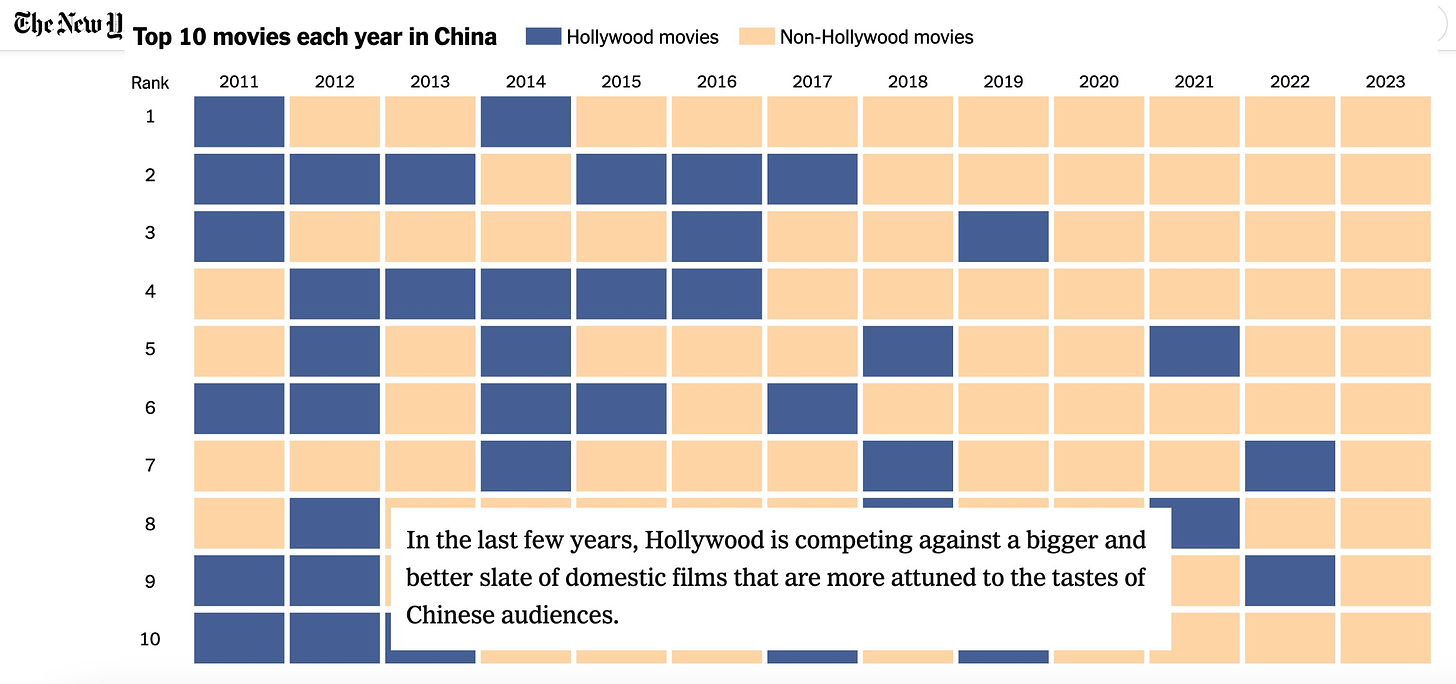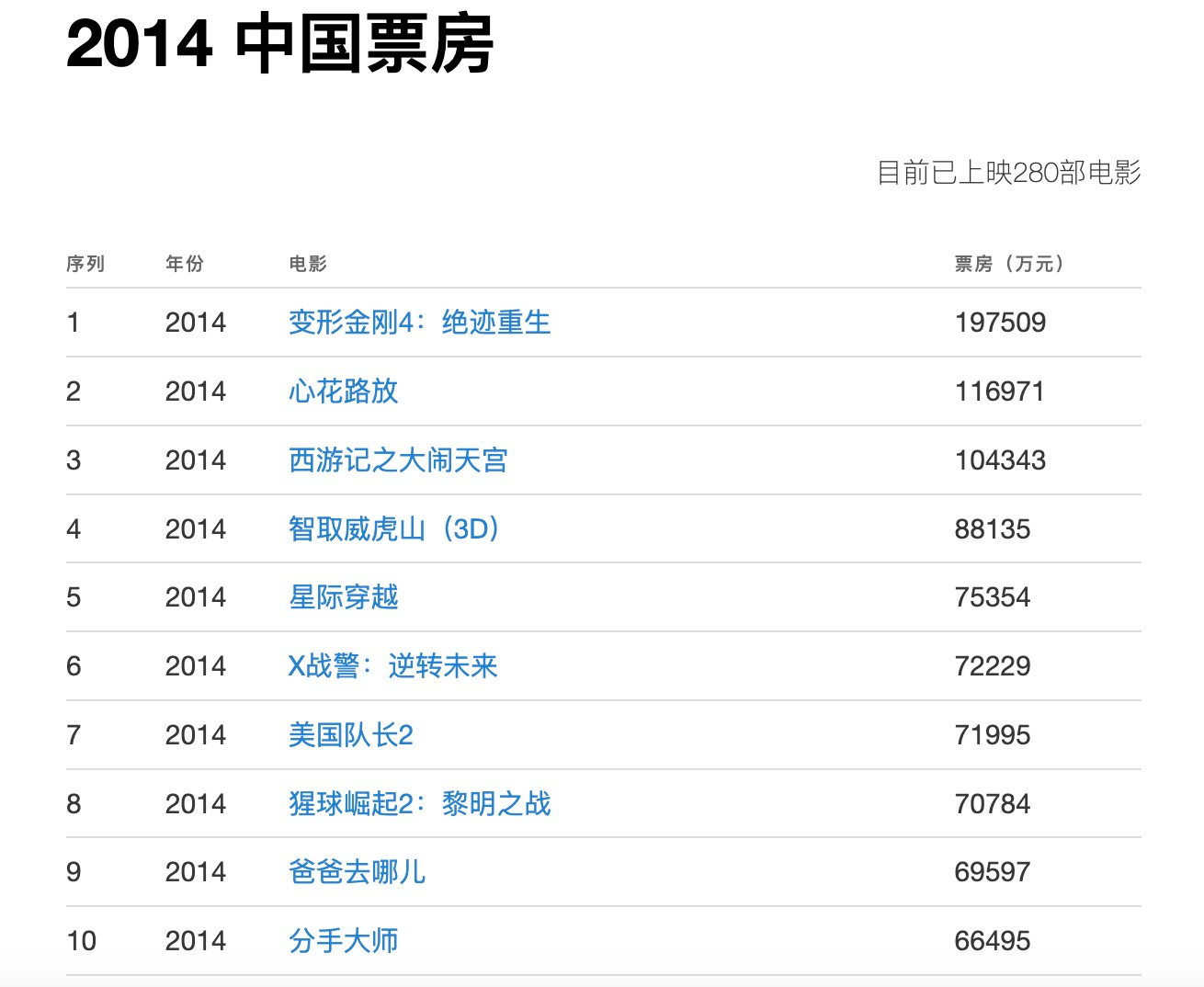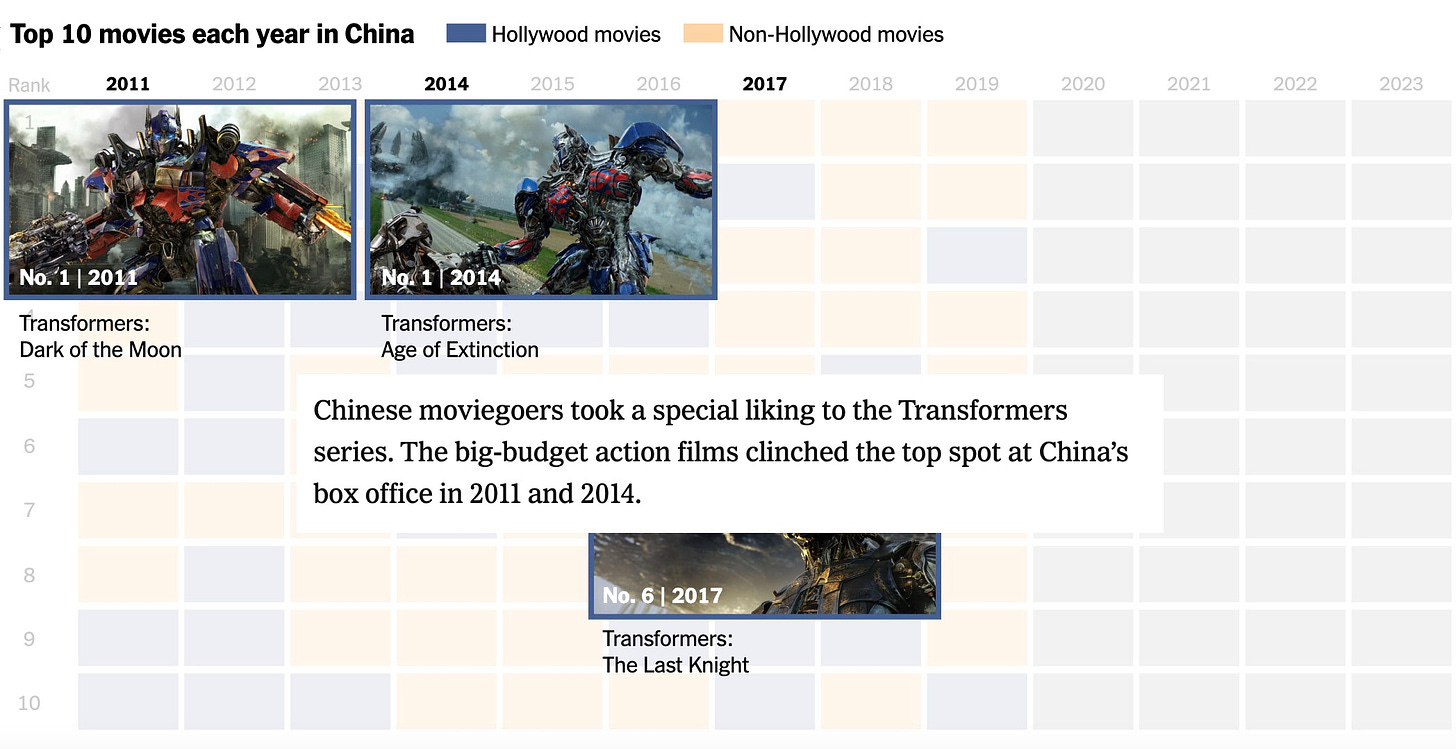Have gripping Hollywood films lost their grip on China?
The shifting dynamics of cinema-going in China and why audiences are turning away.
Today's newsletter is a bit more lighthearted than usual as we take a fun look back at how American blockbusters have performed in the Chinese market this year (AND perhaps over the past decade).
I've been a movie buff since I was a kid, and I can vividly remember the excitement of going to the cinema with my friends to watch Harry Potter and the Deathly Hallows (Part 1) when it premiered in the Chinese theaters over a decade ago. It was such a memorable experience. So it was indeed a thrill for me to see the Harry Potter series return to theaters this fall.
Last month, I had an opportunity to attend the Golden Rooster Film Festival in Xiamen, a coastal city in southern China, where I watched the Chinese premiere of Here, the latest film by Robert Zemeckis, also the director of the Oscar-winning Forrest Gump.
During the film festival, I participated in a seminar featuring a conversation between Director Zemeckis and acclaimed Chinese filmmaker Chen Kaige. I also had an excellent talk with Annie Song, a young Chinese independent producer, on new trends in China's film industry.
Inspired by this experience, I wrote a piece about the role of cinema in cultural exchange, especially between China and the U.S., right after the film festival.
With the year drawing to a close, I thought it’d be nice to wrap up the year with a reflection on the movie scene and take a closer look at how American blockbusters have performed in the Chinese market throughout this year. After all, Hollywood plays a significant role in the global film industry, and China remains one of its most important markets. [Fact check: China has been firmly positioned as the second-largest movie market globally since it overtook Japan in 2012.] And that’s how this newsletter came about.
In total, around 30 U.S. films were released in the Chinese mainland, with a mix of blockbusters, sequels, and adaptations capturing the attention of local audiences.
One of the most recent and highly anticipated releases is 《狮子王:木法沙传奇》 Mufasa: The Lion King, a prequel to the 2019 version of The Lion King, officially premiered in Chinese theaters on Dec. 20, garnering a box office of 10.48 million yuan (about 1.46 million U.S. dollars) on the first day. According to Maoyan, even before its official release, nearly 90,000 people were eagerly anticipating its debut in China, with the vast majority giving it a perfect score of 10 out of 10.
I’ve compiled a list of the top three American films released in the Chinese mainland that grossed over 500 million yuan, as well as 10 American films that grossed between 100 million and 500 million yuan as follows, according to data from Maoyan Professional Version.
Box office earnings over 500 million yuan
Top 1:《哥斯拉大战金刚2:帝国崛起》 Godzilla x Kong: The New Empire
Box Office: 957 million yuan
Release Date: March 29
Top 2:《异形:夺命舰》Alien: Romulus
Box Office: 786 million yuan
Release Date: Aug. 16
Top 3:《毒液:最后一舞》 Venom: The Last Dance
Box Office: 684 million yuan
Release Date: Oct. 23
Box office earnings over 100 million yuan
《死侍与金刚狼》Deadpool & Wolverine (Box Office: 430 million yuan; Release Date: July 26)
《神偷奶爸4》Despicable Me 4 (Box Office: 423 million yuan; Release Date: July 12)
《变形金刚:起源》Transformers One (Box Office: 152 million yuan; Release Date: Sept. 27)
《功夫熊猫4》Kung Fu Panda 4 (Box Office: 373 million yuan; Release Date: March 22)
《沙丘2》Dune: Part Two (Box Office: 352 million yuan; Release Date: March 8)
《头脑特工队2》Inside Out 2 (Box Office: 344 million yuan; Release Date: June 21)
《猩球崛起:新世界》Kingdom of the Planet of the Apes (Box Office: 209 million yuan; Release Date: May 10)
《寂静之地:入侵日》A Quiet Place: Day One (Box Office: 129 million yuan; Release Date: June 28)
《养蜂人》The Beekeeper (Box Office: 114 million yuan; Release Date: Jan. 12)
《海洋奇缘2》Moana 2 (Box Office: 102 million yuan; Release Date: Nov. 29)
It's clear that the three films grossing over 500 million yuan are all iconic Hollywood blockbusters. Yet, even the highest earner, Godzilla x Kong: The New Empire, didn't break the 1 billion yuan mark, falling well short of expectations.
It’s noteworthy that Alien: Romulus, a horror film rated R in the U.S. for bloody violence and strong language, was released uncut in the Chinese mainland.
The film grossed approximately 351 million U.S. dollars worldwide, with 105 million U.S. dollars (30%) coming from domestic box office sales. Surprisingly, its performance in China outpaced that in the U.S., earning 786 million yuan.
One key factor in the film's success this summer may have been the controversy surrounding its content, particularly the news of parents complaining that the movie's intense scenes had terrified their 8-year-old children.
The story quickly went viral, trending on Weibo, X-like social media platform in China, with 140 million views. Many Weibo users however pointed out that the film poster clearly stated "Parental Advisory: Not Suitable for Minors," shifting the blame back onto the parents.
Probably, these discussions have sparked curiosity among potential audiences, and many then flocked to theaters to see what the fuss was about.
To better understand the performance of these American blockbusters in the Chinese market, a key indicator is the list of the top ten highest-grossing films in China this year.
On Nov. 27, the total box office revenue in the Chinese mainland officially reached 40 billion yuan for the year, three months later than last year. Leading the way is 热辣滚烫 YOLO, which has claimed the top spot as the highest-grossing film of the year, grossing 3.46 billion yuan. Following closely are 飞驰人生2 Pegasus 2 and 抓娃娃 Successor, securing second and third place, respectively, both surpassing 3.3 billion yuan.
The top eight box office-grossing films this year are all domestically produced, with only one American film making it into the top 10 -- Godzilla x Kong: The New Empire, which ranks 9th. Alien: Romulus, ranked 11th, came close to breaking into the top 10, but was edged out by the Japanese animated fantasy film The Boy and the Heron, which claimed the 10th spot.
From this, it’s clear that the lion’s share of this impressive 40 billion yuan comes from homegrown Chinese films. On the other hand, Hollywood blockbusters, once the uncontested champions of the Chinese market, now seem to be in a deep slump.
This year is not an isolated instance of Hollywood films losing their appeal among Chinese audiences; it’s part of a broader trend that has been unfolding over the past few years.
This trend calls to mind an insightful article published by The New York Times in early 2024, titled "Why China Has Lost Interest in Hollywood Movies," which examines why no American films ranked among the 10 highest-grossing in China in 2023.
This is a stark contrast to the past when Hollywood superhero films consistently shattered box office records in China.
Rolling back ten years, half of the top 10 highest-grossing films in 2014 in the country were American blockbusters, and the highest-grossing film at the time was Transformers: Age of Extinction, which grossed nearly 2 billion yuan. Interstellar, X-Men: Days of Future Past, Captain America: The Winter Soldier, and Dawn of the Planet of the Apes took 5th to 8th place, each grossing over 700 million yuan.
This trend is also captured by Statista, an online statistics portal providing data on various sectors, in a recent articlepublished by Lai Lin Thomala on the statistics & facts about the film industry in China.
"Hollywood studios are eager to grab a slice of China's lucrative box office market, but it has become increasingly difficult for foreign titles to expand their market share in China......Chinese filmmakers have enhanced their competitiveness, content quality, and variety. Many latest releases have been well-received among Chinese movie fans and generated over 100 million yuan in the box office," the author noted.
The author also put forward that in the recent few years, the appeal of domestic productions focusing on national sentiment remained strong, with Full River Red being the blockbuster in 2023. Other mega-hit domestic titles are the sci-fi movie The Wandering Earth, the animation film Ne Zha, the war film The Eight Hundred.
As far as I see, there could be several reasons behind it.
1. Domestic films on the rise
On one hand, the Chinese film market has been beefing up its production content and quality, with a growing number of films -- ranging from sci-fi blockbusters to narrative-driven stories -- that cater to local tastes and are produced to high standards. The industrialization of filmmaking has significantly improved, as seen in smash hit blockbusters like Creation of The Gods I, Ne Zha, and The Wandering Earth.
Data shows that in 2023, the Chinese mainland film market’s total box office reached 54.9 billion yuan, with domestic films accounting for 83.77 percent of the total box office revenue.
Guo Fan , director of China's sci-fi blockbuster threequel The Wandering Earth, said during an interview with Xinhua that one key advantage Chinese scriptwriters and directors have is cultural resonance.
"Chinese filmmakers and audiences share the same cultural context, which leads to emotional connection and common themes," Guo highlighted. "While Hollywood films are high quality, their reception in China differs from that in global markets. Chinese audiences are increasingly drawn to domestic films, driven by shared emotions and cultural concerns."
2. Fatigue with overreliance on Hollywood IP
Superhero films, with the MCU (Marvel Cinematic Universe) leading the charge, are the most prominent example. Since the release of Iron Man in 2008, and peaking with Avengers: Endgame in 2019, audiences have watched over a decade’s worth of MCU films, totaling more than 20 movies.
The Hollywood writers' strike during the pandemic also severely impacted film quality. A Hollywood Reporter article titled "Now What? The Five Crises Confronting a Post-Strike Hollywood" offers an insightful look into the aftermath.
With writers--the creators of a film's story--on strike last summer, the industry faced a disruption in fresh ideas, leading many films to fall back on formulaic plots and lackluster depth. Relying too heavily on existing IP or repeating familiar storylines, these films struggled to offer anything new or emotionally resonant with the Chinese audiences, especially Generation Z.
To capture the attention of Chinese audiences in the future, American films will need to move beyond their “path dependence” on familiar cultural narratives. While action-packed spectacles and traditional storytelling still resonate to some extent, young Chinese viewers are increasingly seeking more depth and relevance.
3. Fierce competition with streaming platforms
In recent years, movie-watching habits in both China and the U.S. have undergone a dramatic transformation.
"A common challenge faced by the Chinese and American film industries is that during the pandemic, people gradually developed a dependency on online streaming content. After the pandemic, this shift in consumption habits has posed challenges for the film industries in both countries," said Liang Junjian, associate professor at Tsinghua University.
With so many entertainment options now available, movies are no longer the go-to choice for many viewers. Whether it's gaming, live-streaming, or online shows, audiences have more ways than ever to stay entertained. As a result, the entire film industry, including Hollywood, now struggles to capture attention in an increasingly crowded entertainment landscape.
The impact of the 2023 writers' strike has continued to reverberate throughout Hollywood this year, with the overall quality of films falling short of pre-pandemic standards.
However, as the effects of the strike continue to fade, 2025 is shaping up to feature a promising lineup of familiar blockbuster contenders with strong potential in the Chinese market.
Potential Hollywood blockbusters in China for 2025
Personally, I'm betting on Avatar 3, which is set for release at the end of 2025, to make a robust comeback. What about you?










Thanks for this interesting post! I was wondering if you could answer a question about Chinese blockbusters that I have been curious about.
The question is the opposite of the topic of this post: why aren't Chinese blockbusters widely watched outside of China?
I'm quite curious about this because I follow box office results as a hobby, and from that can tell you that many Indian blockbusters (like Pushpa 2) have been making good money in the American and international marketplace. Since this shows us that movies originating in emerging markets can be relatively successful in the US, it is strange that Chinese films that make so much money domestically barely make any impact in other marketplaces. You could say that the answer is that Indian blockbusters are just so much better than Chinese blockbusters, but I don't think that is the answer (in fact I think the opposite is true).
Chinese blockbusters have been steadily upgrading their quality and competitiveness, so why does that not translate into international competitiveness?
This question is all the more interesting to me because there is a huge market of diaspora chinese and overseas chinese students in places like the US, but cinemas do not seem interested in meeting that demand. In my country there might be one cinema in a major city playing one screening of a Chinese blockbuster, and that screening is usually 100% full. By contrast, I think the reason that Indian films do well in places like the US is mainly because of the diaspora Indian comminity.
Could you help answer this question? One good answer that has been suggested to me is that Chinese films struggle to secure overseas distributors, but then that just raises the question of why that happens, when Indian films can manage this easily.